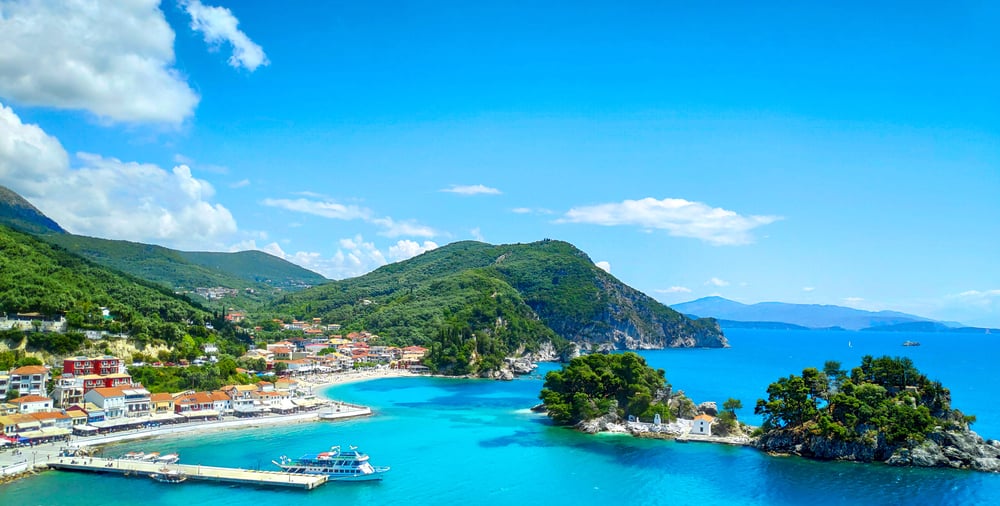When searching for somewhere to retire, the top goals of most retirees are usually some of the following:
- Warm weather
- Stunning beaches
- Friendly locals
- Affordable real estate
- Wonderful local cuisine
- An advantageous location for travel
- Advanced healthcare
- Beneficial taxing programs
It might seem hard to find a place that has all these perks at the same time. Believe it or not, Greece checks all these boxes, making it an ideal retirement destination. In this article, we focus most on the practical aspects of preparing for retirement in Greece: getting to and from Greece, planning for healthcare, and understanding the tax system for pensioners in Greece.

Travel Access
Athens and Thessaloniki offer connections to most other European cities. Direct flights are usually possible during the tourist season, from April to October. For a complete look at travel within Greece and how to reach the islands, compare modes of travel here.

Cost of Living
While the cost of living will depend on the lifestyle you want, the cost of living in Greece is generally low. Fortunately for expats, Greece is much cheaper than most other European countries, in some cases about 50% of the price of larger EU nations. If you are used to eating out, then the average cost of food for you will be around €32 per day. An average meal in a café costs ~€13. The average entertainment activity (think museums, movie theaters, or sightseeing) costs about 20 euros daily. The average monthly gym membership, if that’s your cup of tea, is 35 Euros per month.
Overall, healthcare in Greece is twice cheaper than in most places in the EU. A standard checkup with a family doctor will likely cost 40 Euros. Antibiotic prescription usually costs around 7 Euros for a week’s supply.
The largest cost will likely be housing. The following is an example budget for a modest lifestyle. It is possible to spend more or less based on your needs. Some expats choose to pay more (about 5000 Euros per month), and for locals, it is not unlikely to see families surviving on less (800 Euros per month is not unheard of, for example). The beauty of the Greek lifestyle is that even with a fixed income of a pension, you have the ability to fully enjoy your golden years.
Sample Budget:
Food | 300 |
Healthcare | 250 |
Housing | 600 |
Leisure | 250-300 |
Incidentals | 150 |
Transport | 100 |
Monthly | About 1700 |

Entry Visas
EU Citizens
For citizens of the EU, Iceland, Norway, Liechtenstein, and Switzerland, you don’t need any visa to retire in Greece. You just need to show your passport or ID card from you enter Greece.
If you are from one of these countries and you hope to live in Greece long-term, you will need to get a tax ID. More specifically, if you live in Greece for more than 186 days per year, you are considered a Greek Tax Resident and are required to have a Greek tax number.
Non-EU Citizens
Non- EU citizens require a three-month entry visa known as the “D” type visa. You can obtain an entry visa by visiting the Greek consulate in your country and bringing the following documents:
- Your passport, valid for at least three months after the expiration of the visa
- A biometric passport picture
- The Application form, filled out in English or Greek
- A medical certificate filled out by a doctor
- Proof of medical insurance that is valid in Greece
- An excerpt from the penal register issued by your country of origin or country of current residence
Note that documents many vary from consulate to consulate, and some may require additional information or even an interview.
British Citizens
For British citizens, it is best to consult these websites: Brexit and the status of UK citizens in Greece; the EU-UK Withdrawal Agreement; and Visas.
When you go the consulate, the authorities will interview you and collect biometric data. D-type Visas are valid for 90 days.
US Citizens
For US citizens, you can visit Greece for up to 90 days for business or tourism purposes without a special visa or permit. For entry into Greece, your passport should have 6 months of remaining validity.

Residence Permits
You need to apply for a residence permit if you want to live in Greece. For non-EU citizens, you first need to get an entry visa, and then a residence permit.
The most popular way to get a residence permit for home-seekers in Greece is through the Golden Visa Program, a residency-by-investment program which grants residency, visa-free travel in Europe (for 90 days every 6 months), and family inclusion with a minimum investment of 250,000 Euros (or 500,000 Euros in certain areas). More on the Golden Visa here.
Residence Permit Options
There are several residence permit options besides the Golden Visa, including Residency by Employment, Residency by Family Unification, Residency by Univeristy Studies, as well as a Financially Independent Residence Permit.

Healthcare For Retirees in Greece
Greece has a great public healthcare system that is available for citizens and residents for free or at a very low cost. EFKA is the name of the public healthcare system in Greece.
It’s also best to research private healthcare when you are retiring in Greece. Private healthcare has better facilities, and you are more likely to find doctors that speak English. In addition, the lines are usually longer at public hospitals, so private health insurance is more popular with expats.
Emergencies:
For emergency care or ambulances, call the National Center for Emergency Care (EKAV) ambulance: 166.
If you are on a remote island in Greece without a major hospital, you can get a transfer from an EKAV helicopter or boat to a major city to receive care. For private air ambulances, a few options are Gamma Air Medical and Athens Medevac.
Safety in Greece
In general, Greece is a safe place, especially in the smaller villages. Petty crime is always a threat in major cities and at nighttime, so it’s best to protect valuables.

Next Steps
Now that you’ve sorted out the logistics of preparing for retirement in Greece, now comes the fun part: Where are the best places to retire in Greece?









